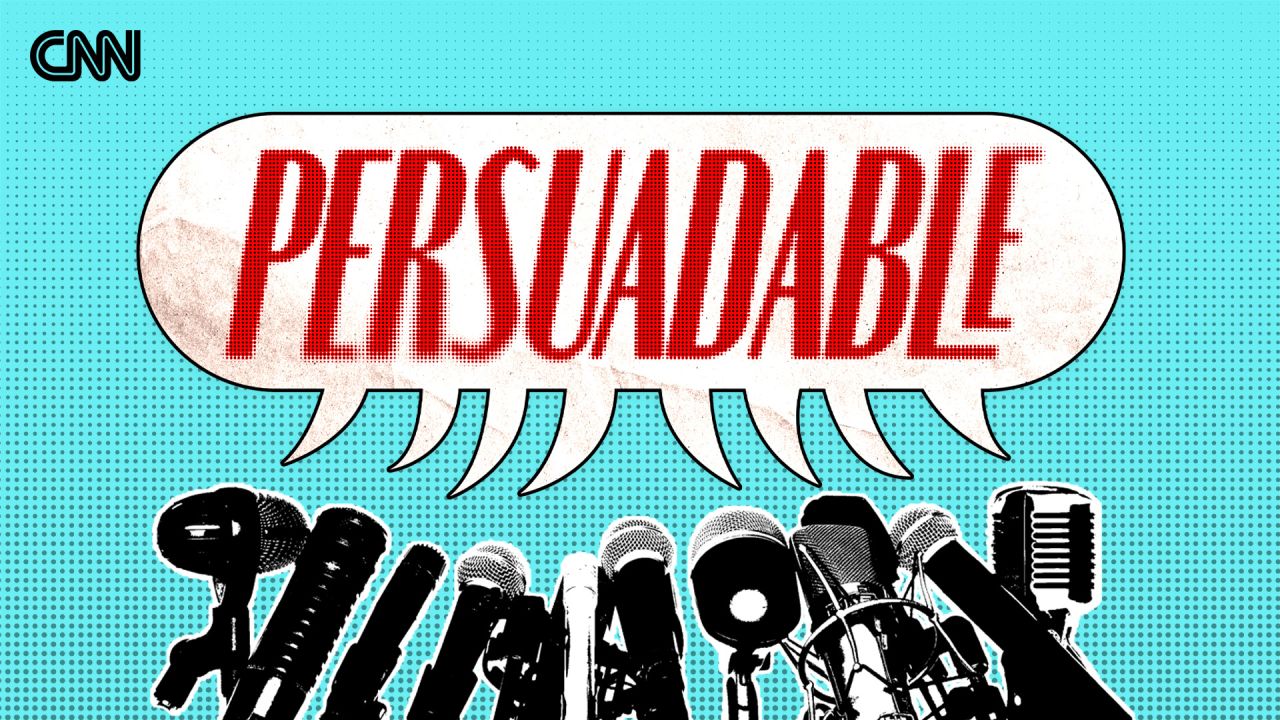Why it’s time we change how we talk about conspiracy theories
CNN
—
Programming note: Listen to the first episode of Persuadable, a new podcast hosted by Donie O’Sullivan here.
“How can you talk to those crazy people?”
I get asked that question a lot.
Over the last few years, I’ve spoken to hundreds — possibly thousands — of Americans whose lives have become consumed by conspiracy theories.
It’s easy, perhaps natural, for us to want to label them all as “crazy.”
But it’s not true.
The overwhelming majority of people I have spoken to are highly productive members of society. They are moms, dads, business owners — they’re your next-door neighbor, your son, your daughter.
They are disillusioned, disaffected, and in some cases they are desperate. But they are not crazy.
They include the many Americans who don’t believe Lee Harvey Oswald acted alone in the assassination of President John F. Kennedy, as well as a group of people I once met who don’t even believe JFK is dead.
In fact, most of us hold some form of conspiracy theory or superstitious belief that others might consider absurd.
This kind of thinking can give us a sense of security by providing easy answers to difficult questions — certainty in uncertain times. It can provide a sense of purpose and community, a kinship among those who understand the “truth” or at least are on our side. An apparent antidote for an era of declining trust in institutions for an age when we are spending less time with each other and more time alone with our phones.
Fear and isolation: It’s why conspiracy theories flourished during the Covid-19 pandemic lockdowns. But for many families, the rabbit holes of 2020 are not a distant memory, they’re an ongoing reality. A loved one coming to the kitchen table every night repeating bizarre claims about vaccines and cabals, becoming increasingly frustrated as their families fail to embrace their newfound “truth.”
Every time I do a story about these kinds of beliefs I receive emails, messages, and hear from people on the street about their brother, their mom, their friend who’s stuck down the rabbit hole. Their question for me is always the same: “How can I help them?”
I never really had an answer. As a journalist on the misinformation beat, I viewed my job more as covering the phenomena of conspiracy theories, how they spread and how they affect people. Occasionally my editor at CNN, perhaps distraught by the seemingly infiniteness of the subject matter, would ask if there were any solutions we could include at the end of a story to make it “less depressing.” There weren’t.

The Account from CNN
Persuadable: Why Do We Believe Crazy S**t?
See more of Donie’s interview with Dr. Samuel Veissière on YouTube.
But in Persuadable, a new limited series podcast from CNN Audio, we try to start a productive conversation about solutions.
Step One is empathy.
After years of talking to people with irrational beliefs, I began to think about some of my own.
I don’t believe in QAnon or the cabal. But I’ve had no shortage of irrational thoughts and obsessions. I’ve long grappled with mental health issues — anxiety, depression, and a particular form of obsessive-compulsive disorder (OCD) that prompts distressing intrusive thoughts.
In my case, irrational beliefs pop up during times of personal uncertainty, stress, or change, and are normally rooted in a false sense of guilt and reasons why I ought to hate myself — thought patterns that are familiar to many who suffer from depression. If a family member gets sick, I can ruminate and convince myself that it is somehow my fault. It’s clearly irrational but at times I can spend days or weeks obsessing about this and telling myself that it is true.
It’s important to point out here you needn’t have mental health issues to hold irrational beliefs. I’m sure you can think of a time where you fell into a cycle of over-thinking something — maybe about a partner or an ex, or a situation at work, or something about your kid. You couldn’t stop thinking about it and the more you thought about it the more stressed you became. Then it turned out to be nothing. Looking back, you can see the thought was irrational in the first place — but it was probably fueled by a genuine fear or insecurity.
Indeed, psychologists I spoke to for this podcast explained how humans are wired to have irrational beliefs and that believing in conspiracy theories doesn’t mean someone has a mental illness.
I bring up my mental health experience because for me it is a way to unlock my own empathy for people who are mired in a world of conspiracy theories.
<div data-uri="cms.cnn.com/_components/video-resource/instances/cma74wo71000e3b6mstsvlaph@published" data-component-name="video-resource" data-editable="settings" class="video-resource" data-fixed-ratio="16×9" data-parent-uri="cms.cnn.com/_components/video-resource/instances/cma71e1ym0000356jcrbuwgjh@published" data-video-id="me8c101f3fcf36f3669d797ccf86b23e5b3f239fd4" data-media-id="me8c101f3fcf36f3669d797ccf86b23e5b3f239fd4" data-live data-analytics-aggregate-events="true" data-custom-experience data-asset-type="hlsTs" data-auth-type="none" data-content-type="uploaded-clip" data-medium-env data-autostart="unmuted" data-show-ads="true" data-source="CNN" data-featured-video="true" data-headline="Why do people believe crazy conspiracy theories?" data-has-video-player="true" data-description="
Persuadable, follows CNN Senior Correspondent Donie O’Sullivan as he investigates how and why some individuals are susceptible to modern conspiracy theories. ” data-duration=”01:18″ data-source-html=” – Source:
CNN
” data-fave-thumbnails=”{"big": { "uri": "https://media.cnn.com/api/v1/images/stellar/prod/flat-broadcast-graphic-1920×1080.jpg?c=16×9&q=h_540,w_960,c_fill" }, "small": { "uri": "https://media.cnn.com/api/v1/images/stellar/prod/flat-broadcast-graphic-1920×1080.jpg?c=16×9&q=h_540,w_960,c_fill" } }” data-vr-video=”false” data-show-html=”” data-byline-html=”
” data-timestamp-html=”
” data-check-event-based-preview data-is-vertical-video-embed=”false” data-network-id data-publish-date=”2025-05-02T17:05:23.797Z” data-video-section=”us” data-canonical-url data-branding-key data-video-slug=”persuadable-donie-osullivan-conspiracy-theories-podcast” data-first-publish-slug=”persuadable-donie-osullivan-conspiracy-theories-podcast” data-video-tags data-breakpoints=”{"video-resource–media-extra-large": 660}” data-display-video-cover=”true” data-details>
<div data-uri="cms.cnn.com/_components/video-player/instances/cma71e20q0004356j26an1qju@published" data-unselectable="true" data-title data-show-ads="true" data-is-vertical-video-embed="false" data-custom-experience data-component-name="video-player" data-autostart="unmuted" data-is-vertical-video="false" data-fixed-ratio="16×9" data-headline="Why do people believe crazy conspiracy theories?" data-auth-type="none" data-video-resource-parent-uri="cms.cnn.com/_components/video-resource/instances/cma71e1ym0000356jcrbuwgjh@published" data-live data-content-type="uploaded-clip" data-video-resource-uri="cms.cnn.com/_components/video-resource/instances/cma74wo71000e3b6mstsvlaph@published" data-poster-image-override="{"big": { "uri": "https://media.cnn.com/api/v1/images/stellar/prod/flat-broadcast-graphic-1920×1080.jpg?c=16×9&q=h_540,w_960,c_fill" }, "small": { "uri": "https://media.cnn.com/api/v1/images/stellar/prod/flat-broadcast-graphic-1920×1080.jpg?c=16×9&q=h_540,w_960,c_fill" } }" data-video-id="me8c101f3fcf36f3669d797ccf86b23e5b3f239fd4" data-media-id="me8c101f3fcf36f3669d797ccf86b23e5b3f239fd4" data-duration="01:18" data-description="
Persuadable, follows CNN Senior Correspondent Donie O’Sullivan as he investigates how and why some individuals are susceptible to modern conspiracy theories. ” data-check-event-based-preview data-network-id data-publish-date=”2025-05-02T17:05:23.797Z” data-video-section=”us” data-canonical-url data-branding-key data-video-slug=”persuadable-donie-osullivan-conspiracy-theories-podcast” data-first-publish-slug=”persuadable-donie-osullivan-conspiracy-theories-podcast” data-video-tags class=”video-resource”>


